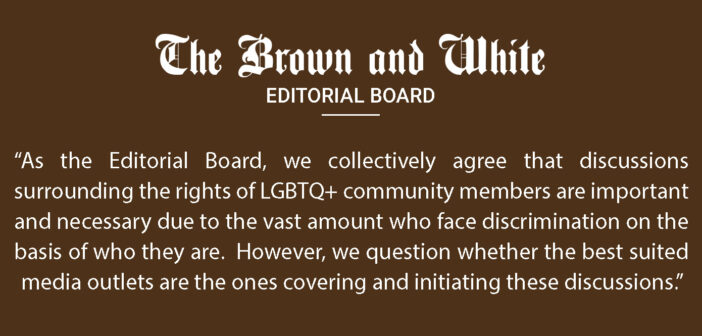So far, 2022 has been a year of records.
NASAs Hubble Space Telescope detected the farthest individual star ever seen just last week. President Joe Biden’s first year in office saw the greatest year of job creation in American history, with more than 6 million jobs created.
However, not all milestones deserve to be celebrated and 2022 has also proven that.
The scary reality is that between Jan. 1 and March 15 of this year, state lawmakers proposed a record 238 bills — that’s more than an average of three per day — that would limit the rights of those who are part of the LGBTQ+ community. Almost half of the bills target transgender people specifically. Some advocates are labeling 2022 as the “worst year in recent history for (LGBTQ+) state legislative attacks.”
Close to home, we see a Republican bill that would keep transgender students from competing in school sports is heading to Pennsylvania’s legislature after making it through the Pennsylvania House Education Committee this week.
The bill is known as the “Save Women’s Sports Act,” and if passed, it would prevent transgender females from competing in school sports with cisgender middle school, high school and college aged girls. Players would be sent to male or female teams based on their assigned sex at birth.
Measures like this that seek to block transgender students from competing on school sports teams aligning with their gender identity, have been some of the most “successful” of the anti-LGBTQ+ bills filed in recent history, with more than a dozen being established as law.
To many individuals, Lia Thomas is a familiar name.
An American swimmer, Thomas has faced controversy over her participation in the University of Pennsylvania women’s swim team. News surrounding the athlete has sparked debate on media outlets that discuss whether she has an unfair advantage in competitions.
16 of her teammates even signed a letter asking Penn officials not to challenge the NCAA’s new policy on transgender athletes, which could have prevented Thomas from competing in the NCAA championships.
As the Editorial Board, we collectively agree that discussions surrounding the rights of LGBTQ+ community members are important and necessary due to the vast amount who face discrimination on the basis of who they are.
However, we question whether the best-suited media outlets are the ones covering and initiating these discussions.
ESPN, the largest sports media outlet in the world, did not make mention of Thomas until her participation in the 2022 NCAA women’s swimming and diving championships was first brought to the public’s attention in late January. Since then, ESPN has published 19 stories about the swimmer.
All the while networks such as OutKick, founded by FOX Sports reporter Clay Travis, have been covering Thomas since before ESPN said anything, now with 38 stories on their website.
This lack of promptness from well-trusted news sources to cover stories such as Thomas’ creates an open space for biased media outlets like OutKick to have a field day and spread flagrant disinformation. When the biggest sports media outlet isn’t touching on such a topic, others like Clay Travis will.
If people want to learn more about transgender athletes, a quick Google search will lead to the articles which are available. A large number of them come from unreliable, partisan and polarizing websites with their own agendas to portray transgender athletes as threats.
In this way, lack of coverage is just as dangerous as covering a story incorrectly. When mainstream coverage barely exists, disinformation about Thomas and other transgender athletes has time to spread across the internet, leading readers to an extreme viewpoint.
What’s been catastrophized as the “end of women’s sports” has sprouted from the just 1.8 percent of high school students and the estimated 1.7 percent of undergraduate and graduate students who identify as transgender.
While an even smaller proportion of school athletes have come out as transgender, media outlets ran with it — give an inch, take a mile.
That doesn’t mean to say the topic is not important — it certainly is if we are to all be treated with the same respect.
But, if there’s one thing we want to leave you with, it’s to be careful with where you look for your news.
Don’t trust so easily when it comes to such important topics. Disinformation is dangerous, but so easy to fall into when there’s nowhere else to look.






Comment policy
Comments posted to The Brown and White website are reviewed by a moderator before being approved. Incendiary speech or harassing language, including comments targeted at individuals, may be deemed unacceptable and not published. Spam and other soliciting will also be declined.
The Brown and White also reserves the right to not publish entirely anonymous comments.
1 Comment
What is a “well-trusted news source”? In my opinion it is not one that agrees with your outlook or even one that reports fact, but one that reports factually and fairly with coverage of various viewpoints. Being an editorial I shouldn’t expect various viewpoints.
“As the Editorial Board, we collectively agree that discussions surrounding the rights of LGBTQ+ community members are important and necessary due to the vast amount who face discrimination on the basis of who they are.
However, we question whether the best-suited media outlets are the ones covering and initiating these discussions.”
I doubt if there are more than a handful of media outlets that give fair coverage to this subject and posit that The Brown and White (B&W) is not one of them. For most media the reason is explained by the pursuit of financial success, for the B&W it is something else. truth and justice as seen by the B&W staff?
The best solution would seem to be accessing several sources and making critical judgments on the various arguments and facts be they true or not.
ABOUT THE BROWN AND WHITE indicates that its coverage and editorials are true to its operating philosophy as is the subject editorial. Fortunately B&W also “aims to serve as a platform for conversation and idea exchange” for those who happen to have different opinions.